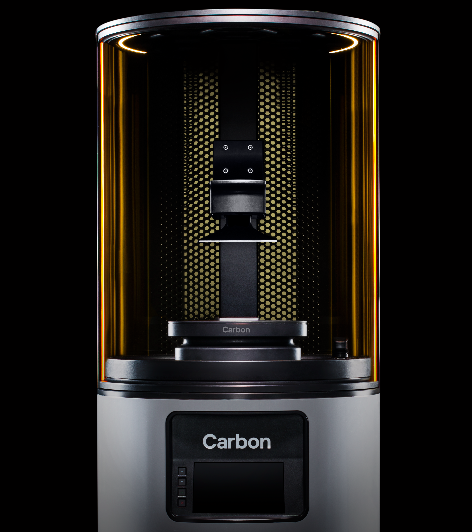Explosive startup Carbon finally announced their first product, the M1 industrial 3D printer.
Carbon splashed onto the 3D print scene last year, when they announced a new method of dramatically speeding up the process of resin 3D printing by applying an oxygen-permeable layer to the bottom of their resin tank. This removed the need for lengthy and tedious “peel maneuvers” as required by most other resin prints. While tank-based resin printing speedups are certainly not unique in the industry, I believe Carbon’s play here is more about materials than printing speed.
But on to the M1 3D printer. Carbon describes it as follows:
The M1 is a powerful new tool for design and manufacturing. For the first time, it’s possible to 3D print isotropic parts with mechanical properties and surface finish like injection-molded plastics. No other additive technology delivers the synthesis of fit, form, and function needed to bridge the gap between prototyping and manufacturing.
The specifications for the machine are good:
- A build volume of 144 x 81 x 330mm. Very tall, not wide.
- Light engine projecting 75 micron pixels (meaning the XY resolution is 0.075mm)
- Onboard GPU processor to speed up motion calculations and push the print durations down as low as possible
- Internet connected, but using “cloud-based servers”, suggesting you may have to be connected to operate the machine – but also permitting remote operations and also monitoring by Carbon
The machine also appears to come with a very strong support program that should address the needs of industry. There are also hints of being able to run arrays of M1’s to provide a means of low-volume manufacturing.
But what this is really about, I suspect, is materials. This is where Carbon will shine, as they have considerable in-house expertise in this area. Expect them to produce very unique and functional industrial resins targeted at their machine.
One final interesting aspect of the M1 is the pricing.
It doesn’t have a price.
It has a subscription.
That’s correct, you must pay a monthly fee to Carbon to operate the M1. This is perhaps why they are using the cloud servers; you’re really paying for access to them.
And what is that subscription price? Here’s what Carbon says:
Our industry-first subscription pricing reduces the overhead involved with capital equipment purchases and the complexity that often comes with the additional service agreements. It makes it possible for customers to leverage CLIP now, without losing the ability to upgrade as new products are released.
And:
Interested in learning more about Carbon? Contact our sales team.
Via Carbon



